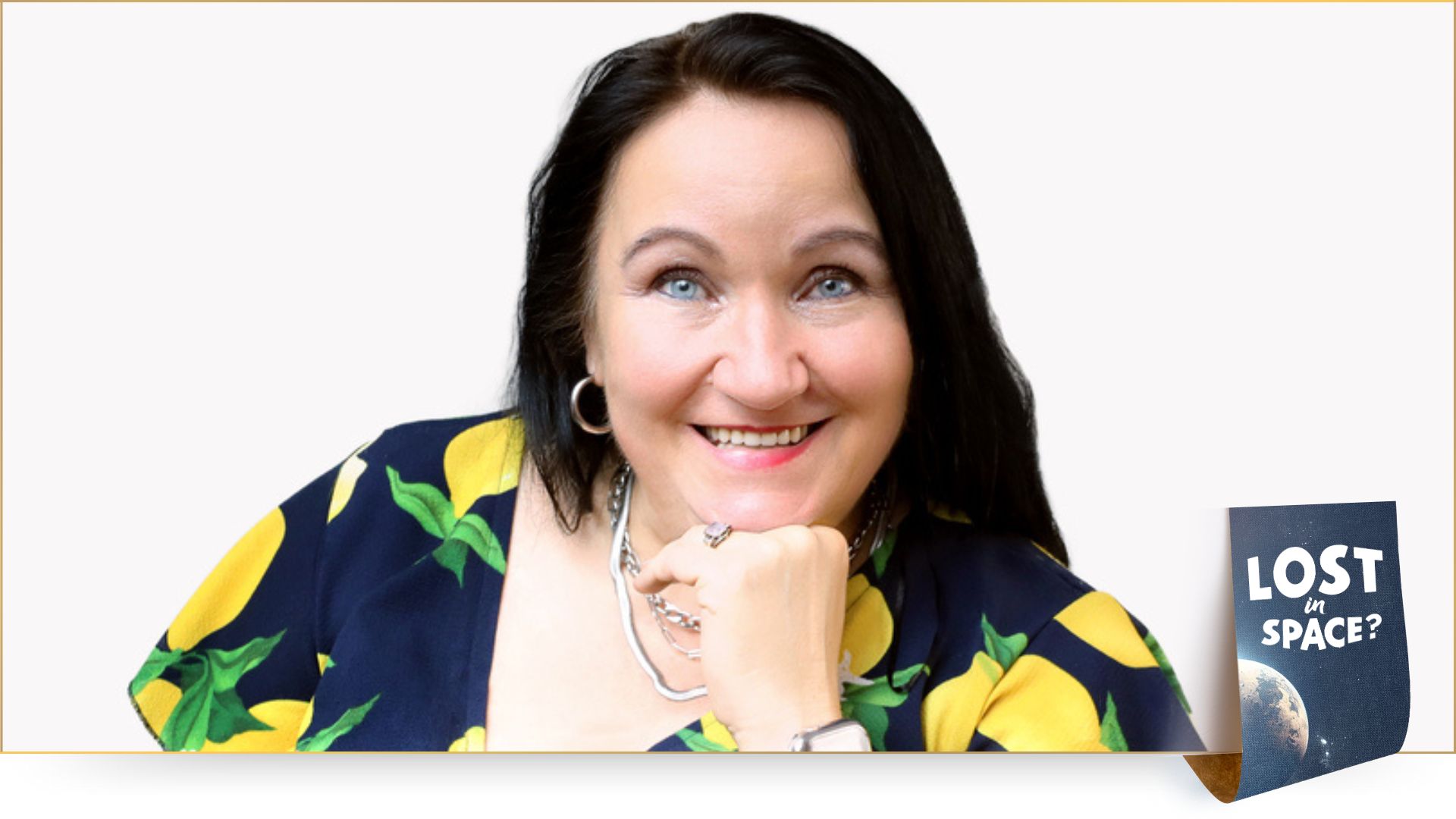 02.06.2025
02.06.2025  Isabel Hempel
Isabel Hempel  4343
4343
“Ihr müsst eure Teammitglieder lieben”
„Ihr müsst eure Teammitglieder lieben. Manche machen es euch leicht, und andere machen es schwerer“, sagt Alexa Ahmad, CEO des pme Familienservice. Sie setzt auf persönliche Nähe und Verbundenheit als Schlüssel zum Unternehmenserfolg und glaubt fest daran, dass die zwischenmenschlichen Beziehungen im Team entscheidend sind, um Konflikte konstruktiv zu lösen, ein harmonisches Arbeitsumfeld zu schaffen und geschäftlich erfolgreich zu sein.
"Es gehört zur unserer Führungsverpflichtung, Menschen, die es uns schwerer machen, lieben zu lernen"
Du legst großen Wert auf persönliche Nähe und Verbundenheit im Unternehmen. Warum verfolgst du diese Philosophie?
Alexa Ahmad: Das hat drei Gründe. Der eine ist, dass ich ein Herz für unsere Teammitglieder habe und ich mich selbst als Mitarbeiterin und Teammitglied fühle. Der zweite ist eine gesellschaftspolitische Verantwortung, die jeder von uns trägt und auch als Unternehmen. Drittens der Business-Kontext: Ich hatte den Fall, dass ein Teammitglied in meinem Führungskreis politisch ganz abseits der anderen stand, und das hat zu extremen Verwicklungen geführt. Wirklich sehr reflektierte Personen konnten das nicht mehr trennen.
Doch wenn wir jemanden komplett als Person ablehnen, ist es vielen Menschen nicht möglich, kooperativ zusammenzuarbeiten. Das hat extreme Auswirkungen auf das Business. Ablehnung wandelt sich oft in Vermeidung oder in andere Reibungen – das führt fast unweigerlich zu schlechteren Ergebnissen in allen Bereichen. Es ist gefährlich, wenn sich Teammitglieder untereinander nicht vertragen. Ich sage zu meinen Teammitgliedern: „Auf mich könnt ihr gerne losgehen, jedoch seid euch untereinander einig“.
Wie definierst du Liebe und Verbundenheit im Kontext vom Unternehmen?
Das bedeutet für mich, dass ich ein positives Bild von Teammitgliedern, Kundenkreis, Partnerorganisationen und Lieferbetrieben habe. Zu meinen Führungskräften sage ich: „Ihr müsst eure Teammitglieder lieben. Manche machen es euch leicht, andere machen es euch schwerer“.
Es gehört zur unserer Führungsverpflichtung, Menschen, die es uns schwerer machen, lieben zu lernen. Dies gilt für alle Menschen, mit denen wir im beruflichen Kontext arbeiten dürfen.
Ein Beispiel: Wir hatten mit einem Kundenunternehmen viel Irritationen und Ärger. Meine Kollegin wollte mit unserer Ansprechperson nichts mehr zu tun haben. Es war eine langjähre Ansprechperson von mir. Sie fühlte, dass ich sie ‚liebe‘ – das bedeutet, dass ich Verständnis für ihre Lage, ihre Nöte und ihr Handeln hatte, auch wenn dies konträr zu unseren Interessen steht. So kamen wir gemeinsam wieder ins wohlwollende Verhandeln und konnten die Probleme unter Berücksichtigung unserer sehr unterschiedlichen Interessen mit neuen Lösungen gestalten.
Wenn wir uns ernsthaft bemühen, zu verstehen, warum jemand so oder so tickt, dann spüren Menschen das. Es geht darum, einen Weg zu finden, wie wir uns treffen können. Um eine Haltung, die wohlwollend ist und offen für neue Vereinbarungen und Lösungen – das meine ich mit ‚Liebe‘.
Wie förderst du eine Kultur, in der deine Teammitglieder sich untereinander unterstützen und wertschätzen?
Ich halte mich selbst nicht für eine gute Führungskraft und versuche mich kontinuierlich zu verbessern. Ich fordere meine Teammitglieder auf, ihre Interessen offen darzulegen und einen lösungsoffenen Austausch zu führen. Nicht selten kommen Menschen zu mir und regen sich wahnsinnig über ein anderes Teammitglied auf. Dann frage ich: Hast du mit der Person gesprochen und erklärt, warum dich das nervt? In 80 Prozent der Fälle sagen sie: Nein!
Jedes Gespräch mit kritischem Auslöser kann, egal wie gut ich vorbereitet bin, scheitern. Das ist dann ein Konflikt. Jedoch kommen über 80 Prozent der Leute, die ich “zurückschicke”, mit ihrem Gegenüber zu einem positiven Ergebnis. Und wenn das nicht klappt, dann bin ich da und unterstütze. Wenn ich es auch nicht fixen kann, nutzen wir unsere speziell für Konfliktklärungen ausgebildeten Teammitglieder.
"Meine Führungskräfte haben auf meinem Bauernhof 'Beißhemmungen'“
Privat lebst du auf einem Bauernhof mit vielen Tieren im Vogelsberg. Welche Rolle spielen die Treffen deiner Führungsriege, zu denen du dorthin einlädst?
Zunächst habe ich diese Treffen nur aus Verzweiflung eingeführt. Mein Zeitplan war eng – ich konnte nicht reisen, und deshalb kamen sie zu mir. Mittlerweile mache ich diese Meetings bewusst auf meinem kleinen Selbstversorgerhof. Ich schätze, es liegt an der ländlichen Umgebung, dort gibt es viel seltener harte Auseinandersetzungen als in den üblichen Tagungsräumen.
Meine Führungskräfte haben dort „Beißhemmungen“ (lacht). Sie benehmen sich im Vogelsberg komplett anders als im Office-Kontext. Es läuft harmonischer ab, sie bzw. wir sind kompromissbereiter und wohlwollender miteinander.
Welche Rolle spielen Feste für das Teamgefühl?
Eine Erkenntnis aus vielen Jahrzehnten als Führungskraft: Ich möchte, dass wir nur Leute einstellen, die gewillt sind, mit uns Feste zu feiern. Ich warne meine Führungsleute inzwischen: „Wenn du jemanden einstellst, der das grundsätzlich ablehnt, dann möchtest du Ärger“. Maximal sind das vier Events pro Jahr, z. B. Teambuilding, Sport-Events, Weihnachtsfeier, Sommerfest, kleinere Teamevents.
Ich habe festgestellt, dass Menschen, die dort nicht auftauchen wollen, das ganze Jahr über ein hohes Konfliktpotenzial in ihren Teams haben. Sie kommen durch das Nichtteilnehmen schnell in eine Außenseiterposition, deren Ausmaß sie nicht abschätzen können. Man kann es nicht verallgemeinern, jedoch in der Regel ist das so.
Das heißt nicht, dass wir keine Rücksicht darauf nehmen, wenn jemand eine Sozialphobie hat oder mal ein Jahr lang total gestresst ist, weil er die Pflege der Eltern übernommen hat. Das ist eine andere Sache.
Was hältst du davon, in Unternehmen Netzwerke zu bilden, z. B. für Singles, die auf Partnersuche sind?
Das ist eine Fangfrage, weil du weißt, dass ich seit Jahren von einer unternehmensgestützten Single-Plattform träume. Frauen und z. T. auch Männer gehen oftmals hohe Risiken ein, um potenzielle Partner:innen kennenzulernen.
Es gibt wahnsinnig viele Plattformen, auf denen wir Menschen kennenlernen können – zum Wandern oder Sport treiben –, die alle sehr anonym und unsicher sind. Wir vermitteln seit Jahrzehnten Au-pairs, Seniorenbetreuung und Babysitter. Suchende müssen sich mit ihrer Firmenadresse registrieren und können immer einer Organisation zugeordnet werden. Im Bedarfsfall ist die Anonymität aufzudecken, das ist ein riesiger Schutz.
Wir müssen die Themen Partnersuche und Einsamkeit aus der Schmuddelecke holen und eine sichere Plattform bieten. Der Arbeitgeber hat ein Interesse daran, dass seine Beschäftigten gute, stabilisierende Beziehungen pflegen, romantische Beziehungen, Freundschaften und fachliche Netzwerke.
"Einsamkeit ist ein großes Thema bei Mitarbeitenden"
Also sollte HR die Themen Beziehung, Liebe und Sexualität in den Blick nehmen?
Selbstverständlich wollen wir nicht das Sexualleben unserer Teammitglieder hinterfragen oder gar analysieren. Aber wir müssen verstehen, dass nicht nur der drohende Burnout, das kranke Kind oder der pflegebedürftige Angehörige unsere Teammitglieder belasten. Zunehmend sind es Einsamkeit oder ein unerfüllter Kinderwunsch. Das belastet Menschen stark und führt zu intensiven Lebenskrisen, die sich langsam anschleichen.
Von der Einsamkeit betroffen sind statistisch gesehen genau die, die wir gerade einstellen, nämlich die jungen Leute unter 30. Am schlimmsten leiden die 18- bis 25-Jährigen an Einsamkeit, das hat mich schockiert. Sie ziehen gerade von zu Hause aus, werden selbstständig und kommen abends dann in eine leere Wohnung. Genau hier würde unsere Plattform anknüpfen.
Abgesehen von so einer bisher nicht existierenden Plattform, können Unternehmen schon heute Netzwerke für Zielgruppen einrichten. Das ist nichts Neues! Betriebssportgruppen gibt es schon seit über 100 Jahren und Gruppen für Alleinerziehende oder Frauennetzwerke seit Jahrzehnten.
Die Herausforderung ist es, zu erspüren, welche Gruppenangebote genutzt werden würden. e-Sport-Gruppen* gibt es zum Beispiel leider nur ganz wenige, Kochgruppen sind immer noch topaktuell, oder wie wäre eine Gruppe der Bürohundebesitzendenden?
Grundlage für alles ist, dass das Unternehmen – und als ihre Vertreter:innen die Führungskräfte – es nicht als Gefahr sehen, wenn sich ihre Teammitglieder außerhalb der Arbeitszeit treffen. Dass sie den großen positiven Effekt erkennen, der darin liegt, dass sich die Teammitglieder besser kennenlernen und vernetzen.
*Eine e-Sports Gruppe ist ein digitaler Sportverein: Man trainiert gemeinsam, entwickelt Taktiken und tritt online in Videospiel-Wettkämpfen gegen andere Teams an – teils sogar bei Turnieren mit echten Preisen und Live-Übertragungen. Teamgeist, Technik und Taktik stehen im Mittelpunkt – der Nervenkitzel ersetzt dabei den körperlichen Schweiß.





